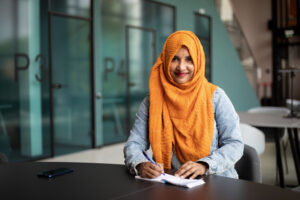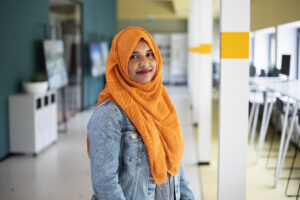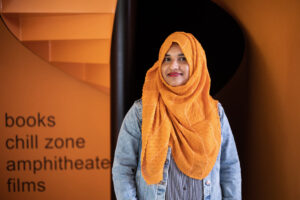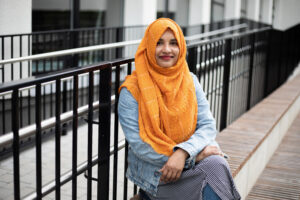She also recalls being the only female employee in the quality assurance department of a textile plant. A manager of the lab, Setara was the one who was creating formulations for the textile dyes and chemicals. She says that people were always surprised to see a young woman managing a whole department.
“Maybe, in my character, there is something that I embrace challenges,” says Setara.
She goes on to explain that while living in China she learned basic conversational Chinese (to prove it, she speaks a bit of it during the interview): “I learned only 1,200 Chinese characters out of 10 thousand available in the ancient Chinese (or 5,500 in a simplified version of Chinese)”.
However, Setara also admits that she has never had any interest in household chores, especially cooking.
“In our culture, it is believed that a girl is born with the skill to cook. However, I first cooked a meal, when I was already in the last year of school. I have five sisters and one brother, and our mother used to divide our household chores among us to teach us the basic household tasks. Whenever was my time to cook, I would swap with one of my sisters,” says Setara with a laugh.
She further added that prolonged periods of living alone have made her turn into an expert chef on selective dishes. Now, Setara has a different opinion on cooking as she believes that cooking is an art and a very special skill anyone may grasp.
Halal meat in the mosque
It is food that presents the most issues for her in Lithuania. Setara, a Muslim, as the majority of her country’s population, says that the greatest challenge here is to find halal meat.
“Sometimes people think that we only don’t eat pork and the rest of the meat is halal, which is not true. Muslims can only eat meat, which comes from the permitted animal slaughtered in an Islamic way,” explains Setara.
Recently, some places where one can buy halal meat in Kaunas have opened. Also, according to Setara, Kaunas has an active Muslim community meeting in the mosque. During Ramadan, one could get a free warm meal there in the evenings for Iftar, which is served by the expat Muslims from different countries. And in the time of Eid al-Adha festival, which is one of the biggest Muslim celebrations, people were sharing fresh meat with the community.
“In Islam religion and Muslim belief, for Eid-al-Adha, if you slaughter an animal, you must divide the meat into three parts – one goes to your relatives, one to your neighbours and poor people, and only one third you can leave to yourself. Muslims living in Lithuania often don’t have relatives here, and they don’t know poor people, so on the day of the festival, they brought the meat to the mosque. I know some students who took several packages of free meat that day!” says Setara.
Both by preference and necessity, Setara became nearly vegetarian in Lithuania. She loves vegetables, so she does not see this lifestyle as a challenge. Except… There is not enough variety.





